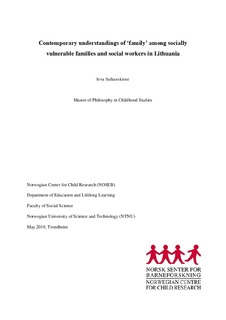| dc.description.abstract | Each person’s definition and perception of his or her family varies. Previous research has argued that the answer to the question of what is a ‘good’ or ‘bad’ family cannot be found, because we all have a distinct set of values that are incompatible. Each family is unique in its composition and practices. However, the theoretical aspects, the expectations and legal aspects of society may not correspond to everyday family life. This discrepancy leads to some families, for instance traditional, being considered more natural than others (Bourdieu, 1996). This study explores socially vulnerable families’ and social workers’ perceptions and experiences of family in contemporary Lithuania. More specifically the study aims to increase our understanding about how socially vulnerable families and social workers define ‘family’, perceive ‘ideal family’ and ‘do family’. Given this, the study attempts to broaden a concept of ‘family’. Additionally, in order to understand how the child is positioned among the families of the study participants, and based on intergenerational interdependencies and intergenerational practices, the thesis rests on the premise that adults’ perceptions of family is valuable within childhood studies and for understanding children’s position and experience of family life. The study has found that the research participants define their family based on the strength of emotional relationships and family practices. In this way, they broaden the concept of ‘family’ by including people outside the biological and legal families. Furthermore, research data revealed that the traditional family model can no longer be defined as dominant as most of the participants live in cohabitation and other types of family forms. This included single parents, divorced or widowed. However, the nuclear family still remains an important aspect while meeting the societal demands for the family. Married heterosexual couple and their children were identified by the participants as one of the most important criterion in defining the ideal family model set by the society. The results of the study also showed that intergenerational communication and assistance to each other is an important value in Lithuanian society. Amongst the other findings, it also emerged that attitudes towards children as active rights holders and active participants in constructing their own lives and those of their families are still relatively ‘new’ among the participants in the study | nb_NO |
